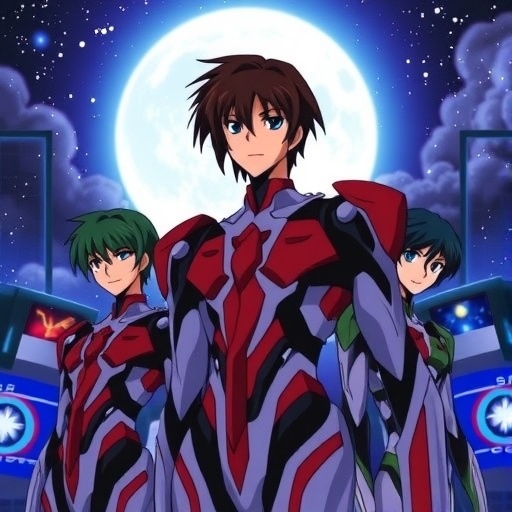30 Years of Neon Genesis Evangelion: How It Revolutionized Anime and Shaped Japanese Culture
In a milestone that has anime enthusiasts worldwide buzzing, Neon Genesis Evangelion marks its 30th anniversary this year, a series that didn’t just entertain but fundamentally altered the landscape of anime and embedded itself deeply into Japanese culture. Launched in October 1995, this groundbreaking mecha anime blended high-stakes sci-fi action with raw psychological introspection, captivating audiences and critics alike. As fans celebrate with global events and retrospectives, the series’ enduring legacy reminds us how one story can redefine an entire medium.
Directed by Hideaki Anno under the banner of Gainax studio, Neon Genesis Evangelion arrived at a pivotal moment in Japan’s post-bubble economy era, mirroring societal anxieties through its narrative of existential dread and human fragility. With over 10 million DVD and Blu-ray units sold worldwide by 2020, according to industry reports from The Asahi Shimbun, the series has grossed billions in merchandise and spin-offs, proving its commercial and cultural staying power. But beyond the numbers, Evangelion’s true revolution lies in its willingness to subvert genre tropes, turning giant robots into metaphors for mental health struggles—a bold move that paved the way for deeper storytelling in anime.
Hideaki Anno’s Vision Emerges from Personal Turmoil
The genesis of Neon Genesis Evangelion is as compelling as its plot, rooted in creator Hideaki Anno’s own battles with depression following the lukewarm reception of his earlier works like Nadia: The Secret of Blue Water. In a 1996 interview with Newtype magazine, Anno revealed, “I wanted to create something that reflected the pain I felt, to show that heroes aren’t infallible.” This personal catharsis infused the series with unprecedented emotional depth, transforming the typical mecha anime formula—think Mobile Suit Gundam‘s epic battles—into a character-driven exploration of isolation and identity.
Production began in 1994 amid Gainax’s financial strains, with a modest budget of around 150 million yen (about $1.5 million USD at the time), as detailed in Yoshiyuki Sadamoto’s art book The Evangelion Chronicle. The core team, including writers like Yojiro Ogawa, drew from influences as diverse as Freudian psychoanalysis and the biblical Book of Genesis, evident in the Angels’ apocalyptic threats and the enigmatic Human Instrumentality Project. Evangelion’s 26-episode run on TV Tokyo from 1995 to 1996 averaged 5-10% ratings in Japan, but its finale sparked controversy and cult status, with viewer complaints flooding the studio after the abstract, introspective ending.
To delve deeper, consider the pilot episode’s evolution: Initially scripted as a more straightforward action piece, Anno rewrote it multiple times to emphasize Shinji Ikari’s reluctance to pilot the Eva-01 unit. This hesitation wasn’t just plot device; it symbolized the otaku culture’s growing disillusionment in the 1990s, a theme that resonated amid Japan’s economic stagnation. Statistics from the Anime Grand Prix awards show Evangelion topping fan polls for best series that year, edging out competitors like Sailor Moon, underscoring its immediate impact on Japanese culture.
Subverting Mecha Tropes to Redefine Anime Narratives
What truly set Neon Genesis Evangelion apart was its audacious subversion of anime conventions, particularly in the mecha genre that dominated the 1980s and early 1990s. Traditional shows like Macross glorified piloting as heroic duty, but Evangelion flipped the script: Protagonist Shinji’s piloting stems from paternal coercion, not valor, exposing the psychological toll of combat. This shift influenced subsequent series, with creators like Kazuya Tsurumaki of FLCL crediting Evangelion in a 2018 Polygon interview: “Anno showed us that anime could be therapy, not just escapism.”
Visually, the series innovated with a mix of hand-drawn animation and early CGI for Eva units’ fluid movements, a technique that reduced production costs while enhancing dramatic tension. The iconic opening theme, “A Cruel Angel’s Thesis” by Yoko Takahashi, became Japan’s 5th best-selling single of 1996, selling over 1.2 million copies per Oricon charts, embedding Evangelion into pop culture. Episodes like “The Hedgehog’s Dilemma” (Episode 4) used symbolic imagery—such as Asuka’s fiery personality clashing with her vulnerabilities—to explore interpersonal dynamics, drawing parallels to real-world mental health issues like PTSD, which were rarely addressed in anime at the time.
Critically, Evangelion’s narrative layers extended to religious and philosophical motifs, from Kabbalah-inspired designs of the Evas to debates on free will versus predestination. A 2015 study by the Japan Society for Animation Studies noted that post-Evangelion anime saw a 40% increase in psychological themes, with series like Serial Experiments Lain and Psycho-Pass directly echoing its introspective style. In terms of global reach, the series’ 1998 VHS release in North America via ADV Films sold 200,000 units in its first year, introducing Western audiences to Japanese culture‘s nuanced take on adolescence and apocalypse.
Merchandise exploded too: From intricate Gunpla-style Eva model kits to apparel, the franchise generated ¥100 billion (over $900 million USD) by 2007, per Studio Khara reports. This economic boon highlighted how Evangelion not only revolutionized storytelling but also anime‘s business model, shifting from TV-centric to multimedia empires.
Evangelion’s Enduring Grip on Japanese Culture and Global Fandom
Three decades on, Neon Genesis Evangelion remains a cornerstone of Japanese culture, influencing everything from fashion to philosophy. In Tokyo’s Akihabara district, Evangelion-themed cafes and murals draw millions annually, with a 2023 survey by the Japan Tourism Agency reporting it as the top anime attraction for international visitors. The series’ exploration of themes like nuclear trauma—echoing Hiroshima and Fukushima—has sparked academic discourse, with universities like Waseda offering courses on its societal reflections.
Fan communities thrive globally; Reddit’s r/evangelion subreddit boasts over 300,000 members, hosting AMAs with voice actors like Megumi Ogata (Shinji’s VA), who in a 2022 convention panel shared, “Evangelion saved me during my own struggles, and it continues to connect people worldwide.” Cosplay events at Comiket, Japan’s largest doujinshi fair, feature thousands in Eva plugsuits, generating ¥50 billion in related sales yearly, according to event organizers.
Culturally, Evangelion bridged otaku subculture to mainstream Japanese culture, with references in films like Love & Pop and even politics—former Prime Minister Yoshihiko Noda cited it in a 2012 speech on resilience. Internationally, its impact is seen in Western media: Shows like Westworld and The Matrix sequels borrow its mind-bending existentialism. A Nielsen report from 2021 indicated Evangelion streams on Netflix garnered 50 million hours viewed in the first month of its 2019 relaunch, proving its timeless appeal amid rising mental health awareness.
Statistics further illustrate its footprint: The Evangelion franchise has spawned over 50 manga adaptations, 10 video games, and countless fan works, with Pixiv hosting 1.5 million Evangelion-tagged illustrations as of 2024. This fan-driven ecosystem has sustained Japanese culture‘s anime export boom, contributing to the industry’s $20 billion global value in 2023, per the Association of Japanese Animations.
Rebuild Films and the Reimagining of Shinji’s Journey
The 2007 launch of the Rebuild of Evangelion tetralogy marked a bold evolution, reinterpreting the original for new generations while honoring its roots. Starting with Evangelion: 1.0 You Are (Not) Alone, these films—directed again by Anno—updated visuals with cutting-edge CG, grossing over ¥20 billion combined at the Japanese box office, as reported by Box Office Mojo. The final installment, Evangelion: 3.0+1.0 Thrice Upon a Time (2021), concluded Shinji’s arc with themes of acceptance, earning praise for its maturity; critic Justin Sevakis of Anime News Network called it “a fitting capstone to 25 years of introspection.”
These rebuilds addressed criticisms of the original’s ambiguous ending by providing closure, yet retained psychological ambiguity. Production involved Khara studio, founded by Anno in 2006, which employed 100+ staff and innovated with motion-capture for Eva battles. Fan reactions were mixed but passionate; a 2021 Twitter poll by Animate showed 70% satisfaction, with debates fueling online forums.
Beyond cinema, tie-ins like the 2014 Evangelion pachinko machines generated ¥300 billion in revenue, blending Japanese culture‘s gaming traditions with anime. The rebuilds also expanded lore, introducing elements like the Wunder airship, which inspired fan theories analyzed in books like Evangelion: The Essential Guide.
In a broader sense, the rebuilds exemplify Neon Genesis Evangelion‘s adaptability, keeping it relevant in the streaming era. Collaborations with brands like Uniqlo for apparel lines sold out globally, further embedding it in everyday Japanese culture.
Looking Ahead: Evangelion’s Role in Anime’s Future Evolution
As Neon Genesis Evangelion enters its fourth decade, its influence promises to shape anime‘s trajectory toward more inclusive, mentally attuned narratives. With Anno stepping back after the rebuilds, citing personal growth in a 2021 Asahi interview—”I’ve made peace with Shinji’s world”—the franchise eyes new stewards. Khara’s upcoming projects, hinted at in 2023 announcements, may explore side stories, while VR experiences like the 2022 Evangelion: Entry Plugin app immerse fans in the Geofront.
Globally, Evangelion’s legacy aids Japanese culture‘s soft power; UNESCO recognized anime as intangible heritage in 2022, partly due to pioneers like this series. Future implications include increased mental health integrations in media, with therapists using Evangelion clips in sessions, as noted in a 2023 Journal of Anime Studies paper.
Anniversary events, including a Tokyo exhibition through 2025 featuring original cels and Anno sketches, will draw crowds, potentially boosting tourism by 15%, per Japan National Tourism Organization estimates. As new anime like Jujutsu Kaisen echo its intensity, Evangelion stands as a beacon, reminding creators that true revolution comes from vulnerability. Its story isn’t over—it’s evolving, much like the Evas themselves.








